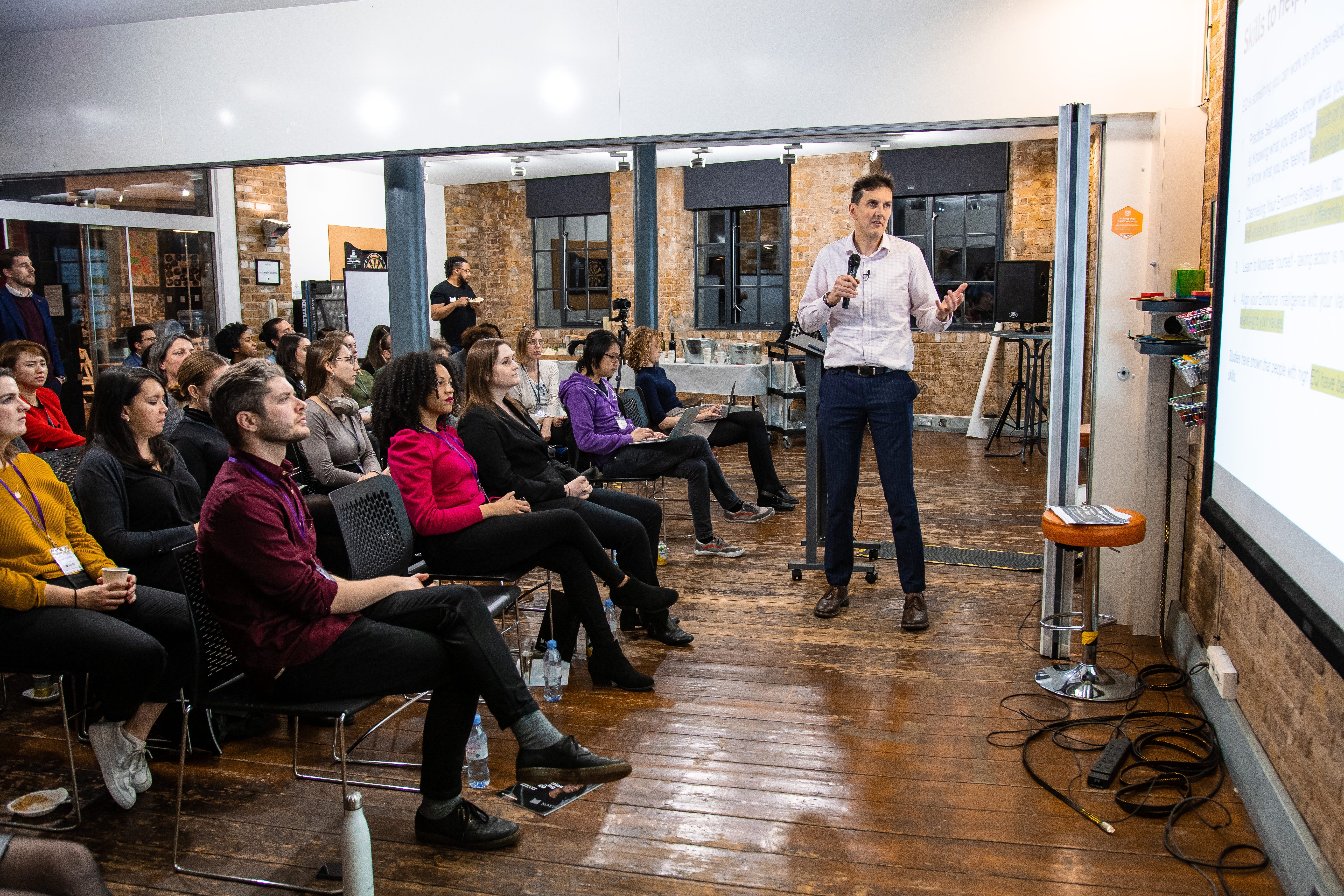
This Mental Health Awareness Week we’re looking at a topic close to our heart at Makers — Emotional Intelligence. To build a successful career in tech you need much more than just technical ability. You need to build resilience and communication skills to thrive and lead.
EI refers to the ability to understand and manage one’s own emotions and those of others. Studies have shown that teams with higher levels of empathy are more productive and creative than those who lack it. And when team members feel that their leaders are invested in their well-being and success, they are more likely to go above and beyond in their roles, take on new challenges, and come up with innovative solutions to complex problems.
This is why at Makers we also teach an emotional intelligence curriculum as part of our course to help people thrive, combat stress, connect with peers and prevent burnout in the real world of work.
Dana Svoboda — Holistic Coach, Makers Chief Joy Officer delves into using feedback to build our EQ.

Download her ebook “An Introduction To Hacking Your EQ” here.
-
Even though feedback is necessary, we often hide from feedback because we’re afraid.
-
Why is feedback so difficult? Well, when we give it, we don’t want to hurt people’s feelings or come across as arrogant. When we receive it, it can be triggering and painful.
-
After all, feedback sits at the crux of two of our core human needs: to be accepted just as we are, as well as our need for learning and growth.
-
Feedback is everywhere. It’s in body language, punctuation, emojis, the sigh from your partner when they find another dirty dish in the sink, or the way another driver honks. There’s nowhere to hide really we’re always swimming in an ocean of feedback.
-
How can we make feedback easier? Shift your perspective, build your self-awareness, understand feedback, and use a framework.
-
Shift your perspective: remember the receiver is empowered — the receiver decides whether or not to take the information on board. Either they will learn and grow from the information or they will exercise their boundaries by choosing not to take it on board. Reframe feedback from a threat to opportunity.
-
Know thyself. Understand what triggers you. Accept that you have blind spots and receiving feedback will help you shine some light on those. We are all works-in-progress.
-
Everyone has a place they return to after they’ve been positively or negatively stimulated. Take the Oxford Happiness Questionnaire to find out what your happiness set point is. This is not a fixed state. You can increase your baseline happiness through mindful meditation. A higher baseline is associated with with greater resilience when it comes to feedback.
-
Understand feedback. There are three types of feedback: appreciation, evaluation, coaching. All of them help you evolve and grow.
-
Use a framework. When giving feedback, use the ASK framework. (A — actionable, S — specific, K — kind.) Being kind is crucial because if you want the feedback you’re giving to land. Lacking tact or kindness means it’s less likely that the person will receive it as well as they’re busy emotionally recovering from poorly delivered feedback.
Simon Rous — Director at Credit Suisse shares tools managers can use to develop the EQ of both themselves and their team members.

Emotional intelligence encompasses self-awareness skills; self-regulation; motivation; empathy and social skills. How do we build our emotional intelligence? After all, EQ is something you can work on and develop like a muscle.
- One technique is Acceptance and Commitment Therapy — this involves mindfulness, cognitive defusion, self as context, values.
- Mindfulness — being present: the practice of being aware of the present moment without judging the experience.
- Cognitive defusion — realising thoughts and feelings for what they really are, passing sensations or irrational things that we tell ourselves — instead of feelings that will never end or factual truths.
- Self as context — the idea that an individual is not simply the sum of their experiences, thoughts, or emotions. The “self as context” concept is that there is a self outside of the current experience. We are not only what happens to us. We are the ones experiencing what happens to us by understanding our emotions.
Why is mental wellbeing important to your tech team? Mental health disorders accounted for the majority of days lost due to work-related ill health… 8.2 million per year, which is a huge number. What can leaders do?
- Consider a 360-degree feedback process — from peers, reports, as well as management. It has to be done with sensitivity and with control but it’s a tremendous tool especially for management who often don’t get feedback from teams. It’s a great tool for self-awareness. And it’s useful for recognising cultural differences, as different cultures might want to give and receive feedback in different ways.
- Coach best practice with difficult interactions and deadlines. Recognise that when a demanding client is angry, they are angry with the situation rather than you.
- Encourage breaks including outside time; vary the environments through the day.
- Encourage mentor/mentee relationships to build self-awareness as well as an awareness of what others in the organisation seek and need.
Sarah Rench — Director of AI and Industry Solutions at Avanade explains the link between EQ and AI

EQ can have a powerful impact on an organisation’s measurable success, and it will continue to serve a critical role in ensuring diversity and preventing bias in technology moving forward. As AI continues to advance and become more integrated into our daily lives, it is imperative to prioritise EQ to ensure that these systems are serving us well.
When it comes to developing AI, EQ becomes increasingly important for tools like the below:
- Intelligent automation and bots: intelligent help-desk with natural language processes
- Employee Experience Bots: sales enablement and support bot, HR bot, etc.
How can we personally develop necessary AI or EQ skills?
- Develop internal AI skills: online coding courses or training to understand data science, Python or R.
- Networking and partnerships: take advantage of any opportunities to meet new people, build connections and partnerships with key individuals, networking can help build emotional intelligence
- Emotional intelligence: important not just in humans but for AI e.g. virtual agents dealing with customer services/HR but also UX design
“AI ethics” is looking at defining moral principles for Artificial intelligence usage. EQ helps us understand the legal and social implications of AI application.
Sarah believes that we should be Developing AI for Social Good: individuals take responsibility. There is intentional collaboration between government, industry, academia, and civil society. This ensures we use our EQ, IQ, and push for diversity and inclusion in all aspects of our lives to develop better technology, encourage diversity of thought and have not just more successful teams but society.
Want to find out more about using emotional intelligence to improve your tech team culture? Read Dana’s ebook here.

If you would like to know more about how we can help you grow and diversify your tech teams please reach out to our Partnerships Team.
About the Author
The Makers team is dedicated to transforming lives by building inclusive pathways into tech careers. With a mission to align their success with their students' success, Makers challenges traditional education models by integrating training with employment support, helping aspiring developers find roles where they can thrive.